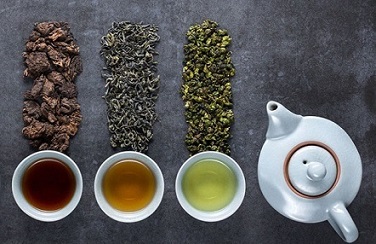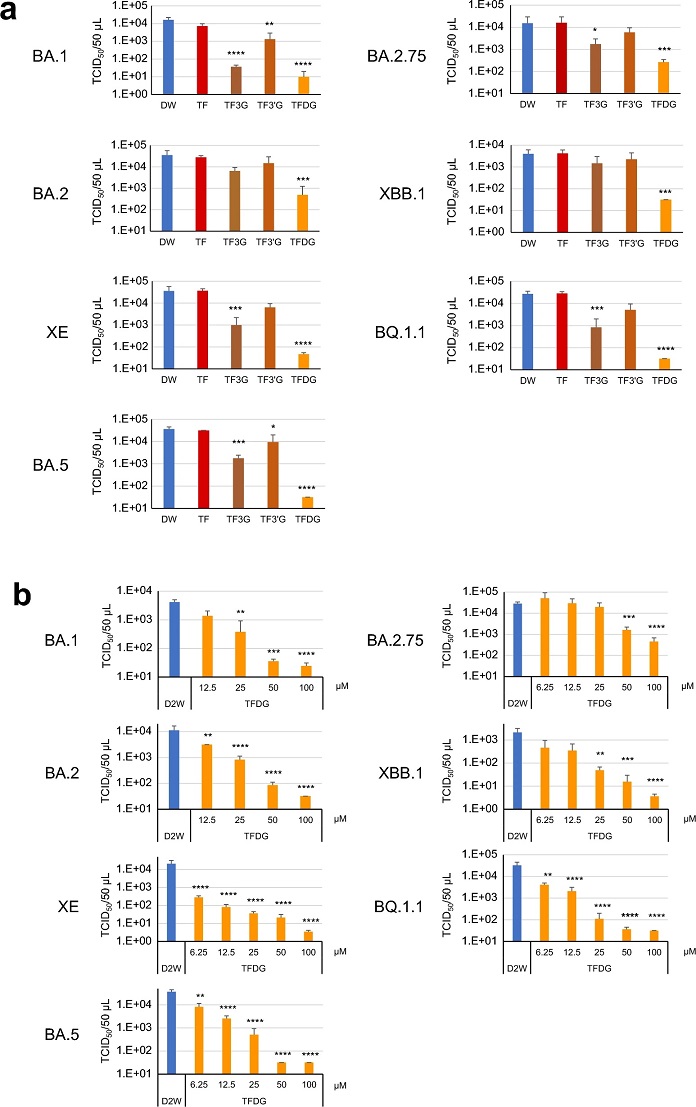BREAKING COVID-19 News! Japanese Study Validates That Catechins And Its Derivatives From Green And Black Teas Inactivate Omicron Subvariants!
Nikhil Prasad Fact checked by:Thailand Medical News Team Oct 04, 2023 1 year, 6 months, 2 weeks, 2 days, 8 hours, 51 minutes ago
COVID-19 News: In a groundbreaking development in the ongoing battle against COVID-19, researchers from Kyoto Prefectural University of Medicine, Fukuoka University, Chiba University, and the Central Research Institute of ITO EN, Ltd in Japan have made a remarkable discovery. Their study, which has far-reaching implications for managing the pandemic, demonstrates that catechins and their derivatives found in green and black teas possess the capability to inactivate Omicron subvariants of the SARS-CoV-2 virus. This discovery comes at a critical time, as the Omicron variant has posed significant challenges due to its high transmissibility and mutation-rich spike proteins.
 The Omicron Variant: A Formidable Challenge
The Omicron Variant: A Formidable Challenge
The emergence of the Omicron variant, officially designated as the B.1.1.529 lineage of SARS-CoV-2, in South Africa in November 2021, marked a concerning turn in the course of the pandemic. This variant, subsequently named Omicron by the World Health Organization (WHO), brought with it a staggering 30 amino acid substitutions, deletion of six amino acids, and an insertion of three amino acids in the spike protein. These alterations have led to heightened transmissibility and the potential to cause breakthrough infections even in vaccinated individuals, resulting in its classification as a variant of concern (VOC). Omicron rapidly spread across the globe in 2022, replacing previous strains of the virus and giving rise to several sub-lineages, including BA.2, BA.5, BA.2.75, and XBB.1, each characterized by additional mutations.
Saliva as a Vector for Transmission
Understanding that SARS-CoV-2 is primarily transmitted through the saliva of COVID-19 patients and asymptomatic carriers is crucial. The virus establishes infections within the salivary glands and oral mucosa, making saliva a potent vehicle for transmission. It is dispersed into droplets and aerosols when infected individuals speak, sneeze, or cough, potentially infecting nearby individuals. Consequently, inactivating the virus in saliva is a pivotal strategy in preventing transmission.
The Potential of Tea Compounds
With the importance of inactivating the virus in saliva in mind, the study team explored various foods and food ingredients known to possess antiviral properties. Their prior work had already demonstrated that green tea, roasted green tea, oolong tea, and black tea could significantly reduce the infectivity of the conventional strain of SARS-CoV-2. Moreover, they had identified specific tea catechins and derivatives, such as (−)-epigallocatechin gallate (EGCG), that rapidly inactivated the virus by binding to the receptor binding domain (RBD) of the spike protein.
Similar antiviral effects were observed with black tea ingredients, including galloylated theaflavins like theaflavin-3-O-gallate (TF3G), theaflavin-3'-O-gallate (TF3'G), and theaflavin-3,3'-O-digallate (TFDG), as well as theasinensin A (TSA), all of which are derivatives of tea catechins. Crucially, these compounds interfered with the interaction between the viral spike protein and ACE2, the receptor on human cells that the virus uses to gain entry. Previous
COVID-19 News coverages by
Thailand Medical News has also covered on the merits of phytochemicals found in green and black teas to combat COVID-19.
https://www.thailandmedical.news/news/covid-19-herbs-scientist-study-phytochemicals-found-in-green-tea-such-as-theaflavins-,-catechins-and-myricetins-as-potential-antivirals-against-sars-c
https://www.thailandmedical.news/news/covid-19-therapeutics-computational-screenings-show-a-variety-of-natural-phytochemicals-could-have-efficacy-against-sars-cov-2-including-egcg-from-gre
https://www.thailandmedical.news/news/japanese-study-shows-that-while-black-tea-has-antiviral-and-therapeutic-effects-against-sars-cov-2-infections,-adding-milk-destroys-its-antiviral-effe
https://www.thailandmedical.news/news/american-study-shows-that-plant-flavonols-and-dihydroflavonols-show-potential-as-antivirals-as-they-inhibit-mpro-of-sars-cov-2-in-vitro
https://www.thailandmedical.news/news/covid-19-herbs-german-study-shows-green-tea,-chokeberry-and-pomegranate-juices-inhibit-sars-cov-2-in-vitro,-but-beware-of-vitro-studies
https://www.thailandmedical.news/news/flavonoids-epigallocatechin,-baicalin,-hesperetin,-luteolin-and-quercetin-helps-prevent-covid-19-induced-gastrointestinal-inflammation-and-diarrhea
https://www.thailandmedical.news/news/observational-clinical-study-shows-that-curcumin-with-catechin-improves-covid-19-infected-patient-s-inflammatory-conditions
Addressing the Omicron Challenge
However, the question remained: Could these tea ingredients also inactivate the Omicron subvariants of SARS-CoV-2? And if so, what specific amino acid substitutions in the Omicron subvariants influenced the binding of EGCG and TFDG to the spike protein?
In a meticulous series of experiments, the study team set out to address these questions and more. They subjected the Omicron subvariants to green tea, Matcha green tea, and black tea. Astonishingly, all tested subvariants, including BA.1, BA.2, BA.5, BA.2.75, XE, and XBB.1, were effectively inactivated within 10 seconds of exposure to these teas. These findings mirrored their previous success with the conventional strain.
The Role of Specific Compounds
To delve deeper into the specific compounds responsible for the inactivation, the researchers investigated the effects of individual tea catechins. Intriguingly, while compounds such as (+)-catechin (C), (−)-epicatechin (EC), (−)-catechin gallate (CG), (−)-epicatechin gallate (ECG), (−)-gallocatechin (GC), and (−)-epigallocatechin (EGC) did not significantly affect the infectivity of the Omicron subvariants, EGCG and its epimer, (−)-gallocatechin gallate (GCG), demonstrated strong antiviral properties. These compounds managed to reduce the virus titers of BA.1 and XE to less than 1/100, and BA.2 and BA.2.75 to approximately 1/10. The potency of EGCG and GCG in inactivating the virus was on par with, or even exceeded, that of freshly brewed green tea.
Further investigation into the concentration-dependent effects of EGCG and GCG revealed that at 1000 µM, EGCG inactivated over 99% of BA.1 and BA.5 viruses but left a small fraction of BA.2, BA.2.75, XBB.1, and BQ.1.1 viruses still infectious. Similarly, GCG at 1000 µM significantly reduced the virus titers of BA.1, XE, and XBB.1 to less than 1/100, while its effect on BA.5, BA.2.75, and BQ.1.1 was less potent, with reduction rates ranging from 1/10 to 1/100.
Exploring the Theaflavins
The researchers also examined the effects of theaflavins (TF, TF3G, TF3'G, and TFDG) on Omicron subvariant infectivity, using concentrations typically found in black tea. TFDG, in particular, stood out, significantly decreasing the virus titers of BA.1, XE, BA.5, XBB.1, and BQ.1.1, albeit with less significant reductions in BA.2 and BA.2.75. TF3G, on the other hand, specifically reduced the infectivity of BA.1 to less than 1/100 without affecting other Omicron variants to the same degree. Intriguingly, non-galloylated TF and TF3'G failed to reduce virus titers to less than 1/100, emphasizing the importance of specific structural features in these compounds.
 Effect of theaflavins on Omicron subvariants. Viruses were treated with each compound at the same concentration in black tea (a) or with the indicated concentrations of TFDG (b) for 10 s. After dilution, virus titers (means ± S.D.) were determined as in Fig. 1 (n = 4). ****p < 0.0001, ***p < 0.001, **p < 0.01, and *p < 0.05 vs. Ctrl (distilled water) (Tukey’s multiple comparisons test).
Effect of theaflavins on Omicron subvariants. Viruses were treated with each compound at the same concentration in black tea (a) or with the indicated concentrations of TFDG (b) for 10 s. After dilution, virus titers (means ± S.D.) were determined as in Fig. 1 (n = 4). ****p < 0.0001, ***p < 0.001, **p < 0.01, and *p < 0.05 vs. Ctrl (distilled water) (Tukey’s multiple comparisons test).
(The phytochemicals from the teas seem to have better efficacy and are more safer compared to that of the serum of vaccinated individuals used in the test of the efficacy of the new vaccine boosters! lol!)
Unraveling the Molecular Mechanism
To better understand the molecular mechanism underlying the interaction between these tea compounds and the Omicron subvariants, in silico molecular docking simulations were employed. These simulations shed light on how EGCG and TFDG disrupted the physical association between the Omicron RBD of the spike protein and ACE2, the receptor on human cells.
Intriguingly, the simulations suggested that the N460K, G446S, and F490S mutations in the RBDs of the Omicron subvariants played crucial roles in determining their susceptibility to EGCG and TFDG. For instance, EGCG was found to interact with various sites on the RBDs, forming hydrogen bonds with specific amino acids depending on the subvariant. These interactions involved both the galloyl group and the 3,4,5-trihydroxyphenyl group of EGCG. In contrast, the G446S substitution in BA.2.75 affected the interaction pattern, making it harder for TFDG to interfere with the physical association between the spike protein and ACE2. On the other hand, the F490S substitution in XBB.1 allowed TFDG to bind to both Patch 1 and Patch 2 of the RBD, potentially contributing to its potent inactivation of this subvariant.
These study findings underscored the nuanced relationship between the specific amino acid substitutions in the Omicron RBDs and the binding affinity of EGCG and TFDG, further highlighting the potential of these tea compounds as antiviral agents.
Clinical Implications
The study didn't stop at in vitro experiments and simulations; it extended to clinical research. Saliva samples were collected from healthy volunteers before and after consuming candies infused with either green tea or black tea. The results were remarkable: saliva collected immediately after candy consumption exhibited a significant ability to inactivate the BA.1 virus in vitro. However, this inactivation effect diminished rapidly after just five or fifteen minutes post-candy consumption, highlighting the need for prompt action.
High concentrations of EGCG and TFDG were detected in the saliva collected from volunteers immediately after consuming the green tea or black tea candies, providing a direct link between the consumption of tea-infused candies and the presence of potent antiviral compounds in saliva.
Conclusion
The groundbreaking study conducted by Japanese researchers has unveiled the remarkable potential of tea catechins and their derivatives, particularly EGCG and TFDG, in inactivating Omicron subvariants of SARS-CoV-2. These findings have illuminated the intricate relationship between specific amino acid substitutions in the Omicron RBDs and the binding affinity of these tea compounds, paving the way for potential therapeutic interventions.
The clinical implications of this research are profound, suggesting that the consumption of tea-infused products could contribute to reducing virus load in the oral cavity and gastrointestinal tract, potentially curbing the spread of the virus from infected individuals to others.
As the world continues to grapple with the challenges posed by the ever-evolving SARS-CoV-2 variants, this study offers hope and valuable insights into the development of strategies to combat future mutant viruses that may emerge, potentially preventing the next pandemic before it takes hold. In the battle against COVID-19, the humble tea leaf may just prove to be a powerful ally.
The study findings were published in the peer reviewed journal: Scientific Reports (Nature)
https://www.nature.com/articles/s41598-023-43563-3
For the latest
COVID-19 News, keep on logging to Thailand Medical News.

